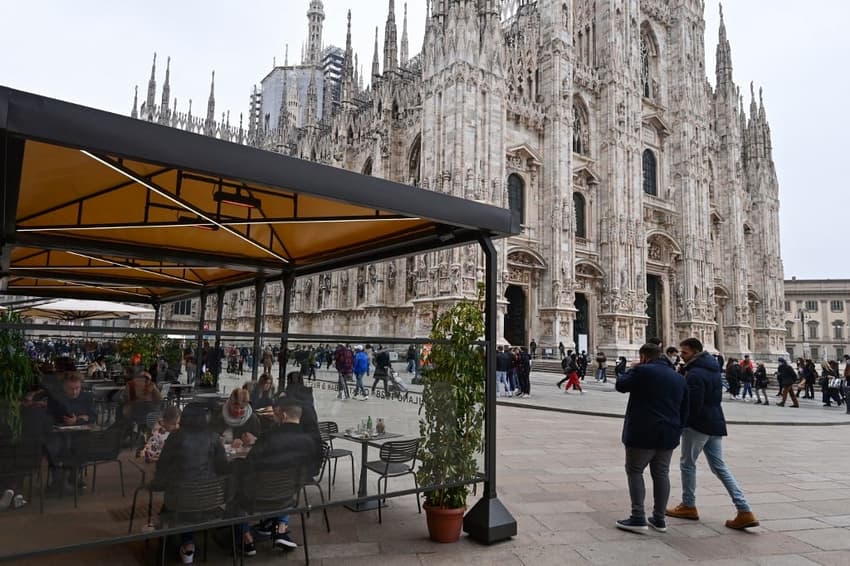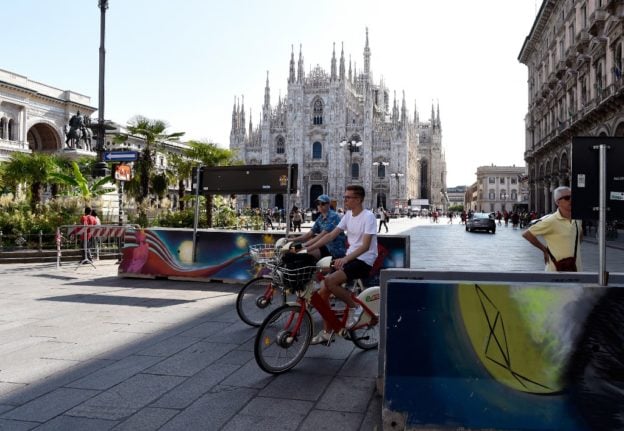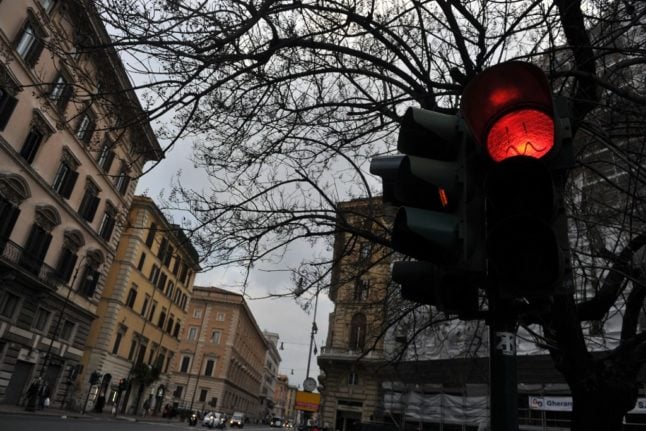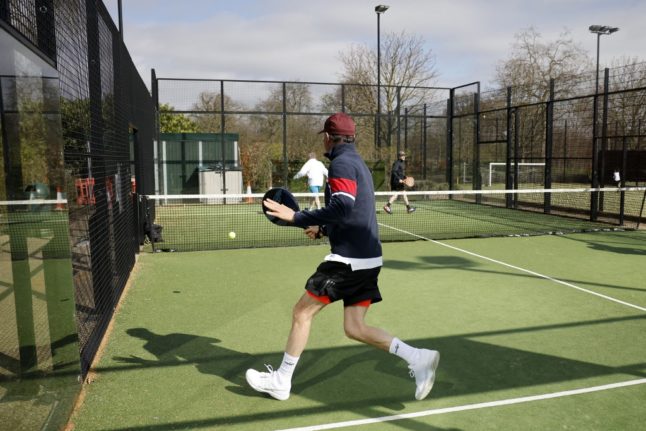Five things you'll only know if you live in Milan

Milan is famous as Italy's economic and style capital, but there are a few things you'll only know about the city if you spend time living here. The Local's Milan-based reporter Giampietro Vianello tells us what to expect.
Milan is well known for being Italy’s economic powerhouse and one of Europe’s most prominent fashion and art capitals, and it is by far the Italian city with the greatest degree of international appeal.
But, much like most other major cities in the world, there are some things about Milan that only residents are really privy to.
READ ALSO: Moving to Italy: How much does it really cost to live in Milan?
Here are five things that you'll know if you live in the northern metropolis.
Electric bikes galore
It’s a bird, it’s a plane… no, it’s an e-bike whizzing past you at the speed of light.
Over the past three years, Milan’s urban landscape has been radically changed by a sweeping e-bike craze.
The main driver behind the city's e-bike mania has been the staggering rise of affordable online rental services, with five different companies now offering residents a chance to quickly locate and hop on an e-bike from anywhere within the city limits.

Milan residents love to move around the city on e-bikes. Photo by Miguel MEDINA / AFP
Regular bikes are also available for rent, but residents seem to have a penchant for darting down the city’s streets on e-powered two-wheelers.
To be fair, e-bikes have become popular in most Italian major cities over the past few years, with the trend propelled by Covid-related restrictions first and government-backed ‘green’ initiatives after.
That said, e-bikers seem to thrive in Milan more than anywhere else in the country as the city offers a total of 144 kilometres of cycle lanes and e-bikes allow residents to quickly slip through the city's traffic.
Apericena: myth or reality?
Milan is the official birthplace of the so-called apericena: classic Italian aperitivi or pre-dinner drinks are served along with a number of snacks (here that's usually skewers, bruschetta and pizza or focaccia) which can essentially replace dinner.
That all sounds great. However, here in Milan only rarely does the concept match the actual execution as the amount of food served isn’t usually that substantial.
READ ALSO: ‘It takes time’: Foreign residents on what it’s really like to live in Milan
Of course, if your plan is to drink on an empty stomach and see double by 9pm, the whole thing might work in your favour.
Otherwise, an apericena in Milan will generally mean forking out anything between 20 and 30 euros and yet feeling peckish for the rest of the night, which is definitely not ideal.
The land of the ‘imbruttiti’
Generalisations are never good and different people shouldn’t be painted with the same brush. That said, as a Milan resident, I’d be remiss not to mention that most Milanesi are indeed fairly short-fused.
While the reasons behind locals’ quick temper still elude even the most respectable of social scientists, you might be interested in knowing that there’s an expression for it: ‘il Milanese imbruttito’, which roughly translates to ‘the pissed-off Milan resident’.
Not convinced? Try pressing the accelerator a tenth of a second too slowly after a traffic light switch and you might just find out the hard way.

Being slow off the mark after a traffic light change is the easiest way to draw the ire of Milan residents. Photo by Christophe SIMON / AFP
Unbearable suffixes
Diminutive suffixes like -ino, -etto, -uccio and -ello are variously used by Italian native speakers to refer to either a particularly small object or place (for instance, a ‘paesello’ is a small ‘paese’ or ‘village’) or to something that’s very dear to them (a ‘fratellino’ is a beloved brother).
Most Italian speakers use these sparingly, only resorting to them when they’re essential to the meaning of a sentence.
But many Milan residents seem to have somehow missed that memo and nonchalantly pepper their conversations with a barrage of suffixes – such as ‘cinemino’ (cinema), ‘cafferino’ (coffee) and ‘vinello’ (wine).
READ ALSO: Why Milan is a much better city to live in than Rome
Even ‘whatsappino’, the latest, hotly-debated Italian neologism, enjoys a certain popularity among Milan locals.
While foreign nationals may find this behaviour amusing, native speakers born and raised far from the northern city usually find it excruciatingly childish and have a hard time putting up with it.
Cases of skin rash following exposure to these dreaded suffixes have been reported in Italy, and we have no intention of verifying these claims.
Padel on the weekend
For those who might not yet be privy to the game’s sacred rules, padel is a racket sport which is in many ways similar to tennis.
However, there are three main differences: the court is enclosed by walls and balls can be played off them; players use solid, stringless bats; finally, when serving, the ball must be hit at or below the waist level.

Milan is Italy’s padel capital, with the city currently boasting as many as 61 padel courts. Photo by Tolga AKMEN / AFP
Though you might not think much of it based on the above description, padel is a lot of fun and Milan is second only to Rome when it comes to the sport’s popularity among residents.
In Milan, most locals tend to play doubles during the weekend, especially on Saturday. So, if you’re new to the city, it’s only a matter of time before one of your colleagues or new city pals sends you a message along the lines of ‘Padelino sabato?’.
Of course, there’s only one correct answer to that question: ‘Dove e a che ora?’ (‘Where and at what time?).
Comments
See Also
Milan is well known for being Italy’s economic powerhouse and one of Europe’s most prominent fashion and art capitals, and it is by far the Italian city with the greatest degree of international appeal.
But, much like most other major cities in the world, there are some things about Milan that only residents are really privy to.
READ ALSO: Moving to Italy: How much does it really cost to live in Milan?
Here are five things that you'll know if you live in the northern metropolis.
Electric bikes galore
It’s a bird, it’s a plane… no, it’s an e-bike whizzing past you at the speed of light.
Over the past three years, Milan’s urban landscape has been radically changed by a sweeping e-bike craze.
The main driver behind the city's e-bike mania has been the staggering rise of affordable online rental services, with five different companies now offering residents a chance to quickly locate and hop on an e-bike from anywhere within the city limits.

Regular bikes are also available for rent, but residents seem to have a penchant for darting down the city’s streets on e-powered two-wheelers.
To be fair, e-bikes have become popular in most Italian major cities over the past few years, with the trend propelled by Covid-related restrictions first and government-backed ‘green’ initiatives after.
That said, e-bikers seem to thrive in Milan more than anywhere else in the country as the city offers a total of 144 kilometres of cycle lanes and e-bikes allow residents to quickly slip through the city's traffic.
Apericena: myth or reality?
Milan is the official birthplace of the so-called apericena: classic Italian aperitivi or pre-dinner drinks are served along with a number of snacks (here that's usually skewers, bruschetta and pizza or focaccia) which can essentially replace dinner.
That all sounds great. However, here in Milan only rarely does the concept match the actual execution as the amount of food served isn’t usually that substantial.
READ ALSO: ‘It takes time’: Foreign residents on what it’s really like to live in Milan
Of course, if your plan is to drink on an empty stomach and see double by 9pm, the whole thing might work in your favour.
Otherwise, an apericena in Milan will generally mean forking out anything between 20 and 30 euros and yet feeling peckish for the rest of the night, which is definitely not ideal.
The land of the ‘imbruttiti’
Generalisations are never good and different people shouldn’t be painted with the same brush. That said, as a Milan resident, I’d be remiss not to mention that most Milanesi are indeed fairly short-fused.
While the reasons behind locals’ quick temper still elude even the most respectable of social scientists, you might be interested in knowing that there’s an expression for it: ‘il Milanese imbruttito’, which roughly translates to ‘the pissed-off Milan resident’.
Not convinced? Try pressing the accelerator a tenth of a second too slowly after a traffic light switch and you might just find out the hard way.

Unbearable suffixes
Diminutive suffixes like -ino, -etto, -uccio and -ello are variously used by Italian native speakers to refer to either a particularly small object or place (for instance, a ‘paesello’ is a small ‘paese’ or ‘village’) or to something that’s very dear to them (a ‘fratellino’ is a beloved brother).
Most Italian speakers use these sparingly, only resorting to them when they’re essential to the meaning of a sentence.
But many Milan residents seem to have somehow missed that memo and nonchalantly pepper their conversations with a barrage of suffixes – such as ‘cinemino’ (cinema), ‘cafferino’ (coffee) and ‘vinello’ (wine).
READ ALSO: Why Milan is a much better city to live in than Rome
Even ‘whatsappino’, the latest, hotly-debated Italian neologism, enjoys a certain popularity among Milan locals.
While foreign nationals may find this behaviour amusing, native speakers born and raised far from the northern city usually find it excruciatingly childish and have a hard time putting up with it.
Cases of skin rash following exposure to these dreaded suffixes have been reported in Italy, and we have no intention of verifying these claims.
Padel on the weekend
For those who might not yet be privy to the game’s sacred rules, padel is a racket sport which is in many ways similar to tennis.
However, there are three main differences: the court is enclosed by walls and balls can be played off them; players use solid, stringless bats; finally, when serving, the ball must be hit at or below the waist level.

Though you might not think much of it based on the above description, padel is a lot of fun and Milan is second only to Rome when it comes to the sport’s popularity among residents.
In Milan, most locals tend to play doubles during the weekend, especially on Saturday. So, if you’re new to the city, it’s only a matter of time before one of your colleagues or new city pals sends you a message along the lines of ‘Padelino sabato?’.
Of course, there’s only one correct answer to that question: ‘Dove e a che ora?’ (‘Where and at what time?).
Join the conversation in our comments section below. Share your own views and experience and if you have a question or suggestion for our journalists then email us at [email protected].
Please keep comments civil, constructive and on topic – and make sure to read our terms of use before getting involved.
Please log in here to leave a comment.